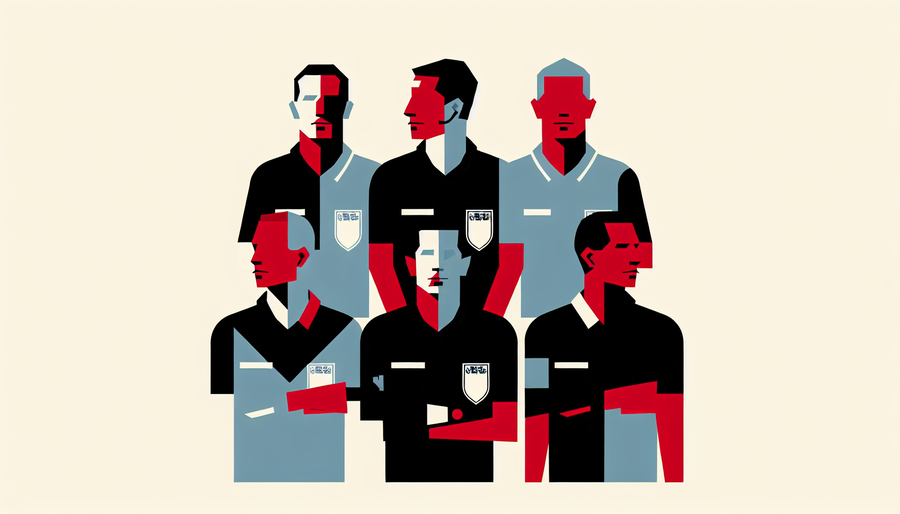The Life of Premier League Referees

Dive into the lives of Premier League referees: selection, VAR impact, and what they earn on the pitch!
Table of Contents
Premier League Referees Selection
Picking Premier League referees isn't just a random draw from a hat. It's a careful process to make sure only the best of the best are calling the shots in some of the most-watched soccer games. Here's a peek into how the Professional Game Match Officials Board (PGMOB) decides who gets the whistle.
How PGMOB Chooses Referees
The PGMOB has a checklist to pick referees for Premier League matches. They look at:
- Experience and Track Record: How many games they've officiated and how well they've done.
- Current Form: Are they on a hot streak or making too many mistakes?
- Club Frequency: Have they reffed the teams too often? We don't want any favoritism.
- Team Allegiance: Which team do they support? No conflicts of interest allowed.
- International Duties: Are they jetting off for international games soon? We need them fresh and ready.
The goal is to keep the game fair and square. To even be considered, referees need to meet tough soccer referee qualifications. They need to know the rules inside out, be fit enough to keep up with the game, and stay cool under pressure.
How Referees Are Announced
Every Monday (or Tuesday if there's a Monday game), the PGMOB announces who will be officiating the upcoming matches. This keeps things transparent and gives everyone—teams, fans, and pundits—a chance to prepare and speculate. These announcements are a big deal, often sparking debates fueled by premier league referee statistics.
For the 2023/24 season, the PGMOL has named 20 referees, including big names like Michael Oliver, Anthony Taylor, and Stuart Attwell. This list, reported by Jobs in Football, ensures that each game is handled by someone who can keep up with the fast pace and high stakes of Premier League soccer.
Want to know who's reffing your team's next game? Check out the premier league referee appointments page for the latest updates on referee schedules and match assignments.
Premier League Referees Structure
The way Premier League referees are organized makes sure games are fair and the rules are followed. Since 2001, the setup has changed to meet the needs of modern soccer, bringing in full-time referees and special roles like assistant referees and VAR referees.
Full-Time Referees
Premier League referees are pros who live and breathe soccer. They've been working full-time since the early 2000s, which means they can focus 100% on their job. These refs go through tough training and constant checks to keep their game sharp. They're the ones making the big calls that can change the outcome of a match. Want to know more about how referees are picked and what it takes to be one? Check out soccer referee qualifications.
Assistant Referees and VAR Referees
Besides the main refs, assistant referees are key players in keeping the game in check. They help with offside calls, throw-ins, and other on-field decisions. According to REFSIX, assistant referees in the Premier League make about £30,000 a year and get an extra £850 per match, adding up to around £50,000 to £60,000 annually.
Then there's the Video Assistant Referee (VAR) crew, a newer addition to the team. These folks review crucial decisions from a video room. Just like the on-field refs, VAR assistants get a £30,000 retainer and £850 per game . They help make the right calls on goals, penalties, red cards, and mistaken identities, keeping the game honest.
The addition of assistant and VAR referees has made a big difference in getting decisions right during Premier League matches. For more stats on how Premier League referees are doing, fans can visit premier league referee statistics. And if you're curious about who’s reffing the next game, the premier league referee appointments page has the latest info.
Premier League Referees Salaries
Premier League referees don't just blow whistles; they manage some of the most intense soccer matches on the planet. Their pay reflects the pressure and skill required. Let's break down how these officials earn their keep.
Base Salaries and Match Bonuses
At the heart of a Premier League referee's paycheck is their base salary. Newbies in the English Premier League (EPL) start at around £70,000 a year. But if you're a seasoned pro like Anthony Taylor, you can rake in over £100,000 annually. On top of that, every game they officiate adds another £1,500 to their wallet. This match fee is a little extra for their prep and performance on game day.
| Experience Level | Base Salary | Match Fee |
|---|---|---|
| New Referee | £70,000 | £1,500 |
| Experienced Referee | >£100,000 | £1,500 |
| Assistant Referee | £30,000 | £850 |
Experience Matters
How much a Premier League referee makes can swing quite a bit, depending on how many matches they handle and how long they've been at it. Take Mike Dean, for example. Before he hung up his whistle in 2022, he was pulling in up to £200,000 a year. That's a hefty sum, showing that experience and reputation can really pay off.
Assistant referees, the unsung heroes who help make those tough calls, earn about £30,000 a year. They also get £850 for each game they assist, bringing their yearly take-home to somewhere between £50,000 and £60,000 . The difference in match fees between main refs and assistants highlights the varying levels of pressure and responsibility.
Want to know more about what it takes to be a Premier League referee? Check out our guide on soccer referee qualifications. Curious about how these refs perform on the field? Dive into premier league referee statistics for a closer look. And if you want to keep tabs on who's officiating upcoming matches, visit premier league referee appointments.
VAR Technology in Premier League
The arrival of the Video Assistant Referee (VAR) system has shaken up Premier League soccer. It's like having an extra set of eyes on the field, making sure those game-changing calls are spot on.
How VAR Works in Premier League Matches
VAR steps in to help with four big game moments:
- Goals and any fouls leading up to them
- Penalty calls and the fouls that cause them
- Straight red card incidents (not second yellow cards)
- Mistaken identity when handing out cards
The VAR squad includes the main video assistant referee (VAR) and three helpers (AVAR1, AVAR2, and AVAR3). These folks are top-notch FIFA video match officials, working from a central video operation room (VOR). They have access to a bunch of broadcast cameras, including super slow-motion ones, to get a clear view of the action .
Hawk-Eye Innovations Limited provides the VAR system, which has been put through the wringer to meet FIFA's global standards. Each stadium had to pass validation matches before the big leagues kicked off.
Making the Right Call
The VAR team only buzzes the on-field ref for clear and obvious mistakes or big missed incidents. This teamwork helps cut down on human error and boosts the accuracy of crucial game decisions.
Studies show that VAR really ups the accuracy of decisions. The numbers don't lie—correct calls happen more often with VAR in play.
Check out how VAR has improved decision accuracy:
| Situation | Decision Accuracy Without VAR | Decision Accuracy With VAR | Improvement |
|---|---|---|---|
| Goals | 93% | 98% | 5% |
| Penalty Decisions | 84% | 98% | 14% |
| Red Cards | 77% | 92% | 15% |
| Mistaken Identity | N/A | 100% | N/A |
Sure, VAR has sparked some debates among fans and pundits, but the stats show it's making the game fairer. If you're curious about how referees are picked and what they do, check out soccer referee qualifications. For more stats on how VAR and refs have shaped Premier League matches, visit premier league referee statistics.
